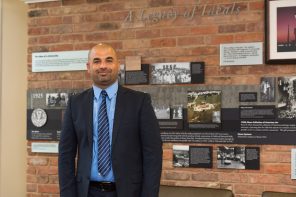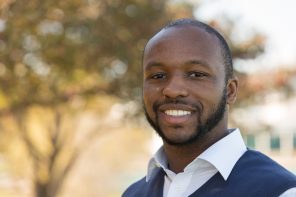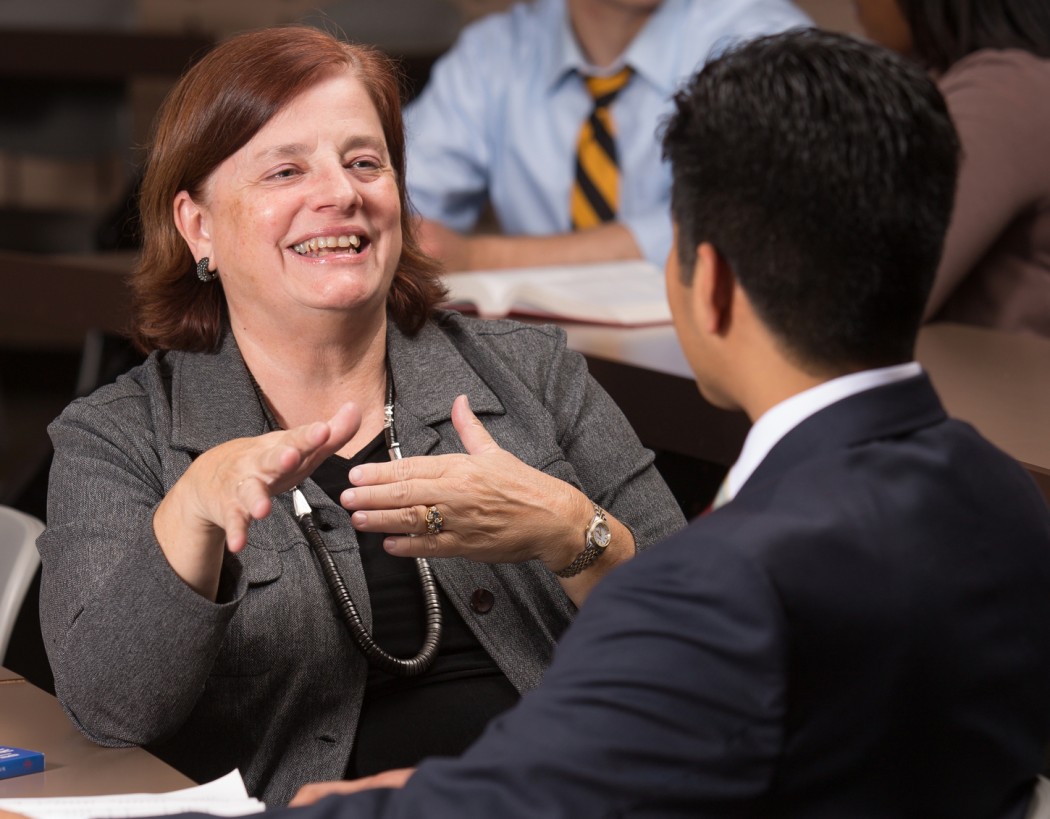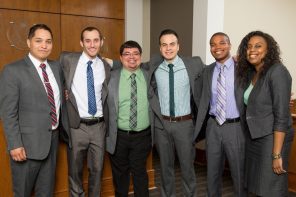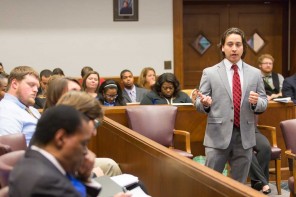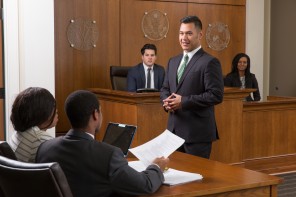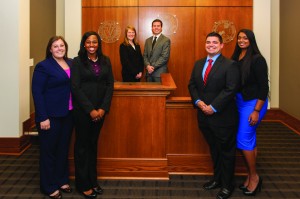One has to know one’s material, explains current Chief Justice (2015-2016) Natasha Corbett, who was part of the team participating in six national moot court competitions in winter and spring 2015. “At the UCLA Cyber Crimes competition, all the judges and attorneys we argued in front of were experts in the areas we were arguing,” she says. “We had a judge come out who had specialized in wiretapping law, and somebody from an agency that was supporting privacy law, so all the people we were arguing in front of were experts in cybercrime, security, or privacy rights.” Intensive preparation, she says, is key: “One judge asked me to explain the triangulation of cellphones, and I described my understanding of how that works. The event was very grueling but one of the best experiences I’ve had.”
Typically sending five travel teams to competitions across the nation, Moot Court Society places law students in front of highly experienced judges, and this represents the ultimate courtroom challenge. Explains faculty advisor Clare Nuechterlein (‘72, ‘75 M.A., ‘78 J.D.),
Moot Court Society is one of the longest running traditions of the Law School.
SPRING COMPETITIONS
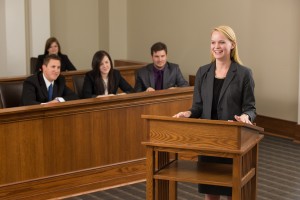 The 2015 season for Valparaiso University Law School Moot Court Society included traveling to six inter-school competitions: the Mardi Gras Sports Law Invitational at Tulane University Law School in New Orleans, LA; the Cyber Crimes Moot Court Competition at UCLA; the William E. McGee National Civil Rights Moot Court Competition, hosted by Hamline University School of Law in Minneapolis, MN; the August A. Rendigs National Products Liability Moot Court Competition at the University of Cincinnati College of Law; the Duberstein Bankruptcy Moot Court Competition at St. John’s University School of Law in Queens, NY; and the Sutherland Moot Court Competition at the Catholic University of America, Columbus School of Law in Washington, D.C., which is the oldest private moot court competition in the country.
The 2015 season for Valparaiso University Law School Moot Court Society included traveling to six inter-school competitions: the Mardi Gras Sports Law Invitational at Tulane University Law School in New Orleans, LA; the Cyber Crimes Moot Court Competition at UCLA; the William E. McGee National Civil Rights Moot Court Competition, hosted by Hamline University School of Law in Minneapolis, MN; the August A. Rendigs National Products Liability Moot Court Competition at the University of Cincinnati College of Law; the Duberstein Bankruptcy Moot Court Competition at St. John’s University School of Law in Queens, NY; and the Sutherland Moot Court Competition at the Catholic University of America, Columbus School of Law in Washington, D.C., which is the oldest private moot court competition in the country.
Corbett is particularly proud of the team’s performance in the Sutherland competition. “Our team placed in the semifinals and our team member Lauren Dietrich won Best Oralist,” Corbett says. The issues are never easy, Corbett says. “At the McGee competition, the issues presented were about same-sex marriage. The Supreme Court ruling on same-sex marriage had not come out yet, but you could tell the tides were turning,” she notes. “Our team had to argue against same-sex marriage. There was not a case law supporting that position. The judges felt one way; our team members were trying to argue the other way. They were trying to help the law help their side.”
MENTORING FROM THE MASTERS
In Moot Court, students have to know the law intricately and be prepared for any challenge. Corbett explains, “Judges know when you’re right and when you’re wrong.”
Rowe agrees that moot court was a daunting challenge. She recalls, “You’re actually litigating and the judges lean into you and pick apart your arguments. I still have nightmares about them tearing apart some of my arguments, but it’s a very beneficial program for those who get to partake in it.”
Looking ahead to 2016, Corbett explains, “In the spring we’re looking at attending four competitions; eight members will compete and there will be a student coach for each team. All student coaches come from the executive board.”
Asked what advice she offers Moot Court Society members, Nuechterlein noted a distillation of tips that she and her husband, Christopher Nuechterlein, a Federal trial judge, like to offer,
Seven words, in a nutshell: be prepared, be candid, be on time. There’s lots of other advice that keys off that, but be prepared; you need to know your case frontwards and backwards. Be candid; you need to put everything in front of the court. Every case has bad facts; don’t hide them. Be on time is obvious, but a lot of lawyers who show up late get in trouble.
CARVING OUT CAREER PATHS
Nuechterlein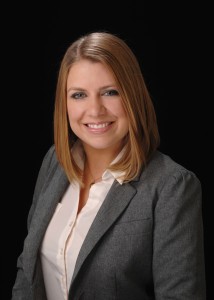 emphasizes that students learn by doing. “Students learn from being carefully critiqued through all of their practice rounds, and at all the competitions, students are critiqued and offered pointers about what they did well and what they can improve. It’s a very intense activity, but they come out of law school way ahead of the game compared with people who haven’t participated in something like this.”
emphasizes that students learn by doing. “Students learn from being carefully critiqued through all of their practice rounds, and at all the competitions, students are critiqued and offered pointers about what they did well and what they can improve. It’s a very intense activity, but they come out of law school way ahead of the game compared with people who haven’t participated in something like this.”
She adds, “The competitions themselves and the specialized class are very helpful in law school, but even more, the skills learned are highly transferable to the profession and the skills are highly sought after. Students haven’t been out there because they haven’t graduated and taken the bar exam yet, but I’m getting them ready for 35+ year careers.” Many members proceed into careers in public service, she notes.
Rowe, who says she always wanted to be a litigator, comments, “I met judges and law professors from across the country. I’m able to say to friends who are looking for a certain type of work, ‘Hey, I know someone.’” Rowe says the Moot Court experience helped her ignite her passions and solidify where she wanted to take her career. “Moot Court Society helped me to be a well-rounded attorney and it helped me build the confidence in my ability to form oral arguments. It taught me to write like an attorney and take a problem from beginning to end to address the legal issue thoroughly and effectively.” Today, Rowe is working as an insurance defense attorney, and aspires to become a law professor someday.
Corbett speaks of her aspirations following her 2016 graduation: “When I began law school I was uncertain as to what I wanted to do. Being in Moot Court Society has helped me understand I love appellate law; I love oral argument; I love digging into the issues. All the things we do are transferable skills. I often see people arguing in front of the bench and being flustered, not knowing what to do. My experience has helped me to be more comfortable. I know how to be an advocate and how to be prepared for whatever happens. It’s been eye-opening.”
Rowe continues to appreciate her Moot Court Society experience, recalling, “Whitney Rhew (‘14 J.D.) and I won a competition in Orange County. It was an intense competition with Ivy League and other big-name schools. When they announced the winner—Valparaiso University Law School—it was priceless. We realized how valuable our education is, and how valuable our professors are. They have prepared us to accomplish anything.”
ANNUAL LUTHER M. SWYGERT MEMORIAL MOOT COURT COMPETITION
The 27th annual Luther M. Swygert Memorial Moot Court Competition, named in memory of the father of Michael Swygert (see Law Review story herein) and longtime Judge of the United States Court of Appeals for the Seventh Circuit, was held November 5, 2015.
To prepare for the Competition, students take a specialized course in Appellate Advocacy taught by Professor Clare Nuechterlein. Her class focuses on complex First Amendment issues that are the basis of the Competition briefs and oral arguments each year.
The Society welcomed an all-female judge panel, including Chief Judge Diane Wood of the Seventh Circuit Court of Appeals; Chief Judge Nancy Vaidik of the Indiana Court of Appeals and Valparaiso Law alumna (‘77, ‘80 J.D.); and United States Magistrate Judge Susan Collins.
This year’s issue focused on symbolic student speech when high school students wore buttons to school to protest an upcoming referendum in their city against same-sex marriage. The buttons read “Screw Hate, Don’t Discriminate.” After the school district banned the students’ buttons, the First Amendment Free Speech litigation ensued. Lively oral arguments and engaged questions from the “hot” bench made for a memorable Competition.
Rowe recalls her experience at the Annual Luther M. Swygert Competition: “The judges watch you perform; they watch you litigate. They see you developing skills as a litigator and they give you real-life advice. I was talking to a Seventh Circuit Court judge when I competed, and he gave me advice on how to transfer from one argument to the next argument. He even coached me on how to introduce myself. He told me I have a great ‘attorney name.’ I’ve been able to apply his advice and I became a better litigator from networking as a student.”
